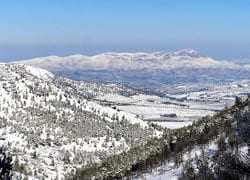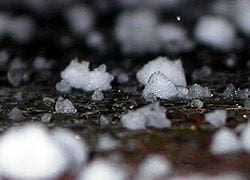production / page 82
Apr. 17, 2011
Lack of Farm Workers in Argentina Weakens Vulnerable Olive Oil Industry
Cultivation in Cuyo is expected to grow 40 percent, but half of this green gold will never make it to store shelves. There are simply not enough workers to harvest the olives.
Apr. 14, 2011
Heavy Rains and High Hopes for Australian Olive Oil This Season
Even with heavy rains, cooler temperatures are likely to improve the fatty acid profiles and intensity of most organoleptic attributes, according to Leandro Ravetti of Modern Olives.
Apr. 10, 2011
Women of the Olive Oil World Make Themselves Heard
One group of dedicated olive oil entrepreneurs, producers and experts are seeking solidarity and change in the male-dominated business culture of Italy.
Apr. 3, 2011 S. America
Catamarca Unveils New Research Facility for Olive Oil Production
Mar. 29, 2011 Production
Mar. 16, 2011 S. America
Mar. 7, 2011 Production
Feb. 24, 2011 Production
California Senator Wolk to Chair Subcommittee on Olive Oil Production
Feb. 22, 2011
Researchers Look at Cyperus as an Olive Oil Substitute
Researchers say the cultivation of the plant would help Egypt and the rest of the Middle East decrease cooking oil imports and find use for desert land.
Feb. 16, 2011
Olive Oil Prices in Spain "Unsustainable"
Olive oil is on shaky ground in Spain as growers and producers demonstrate over record lows in olive oil prices and three consecutive years of selling below cost.
Feb. 14, 2011
Argentina President Promises Aid for Troubled Olive Oil Industry
President Cristina Fernández de Kirchner has pledged federal government help to Argentina's battered olive oil industry following layoffs in the Catamarca region.
Feb. 9, 2011
Italian Olive Oil Sales Up in Latest Report
In numbers released by the Italian olive oil packagers association ASSITOL, domestic and export sales of Italian olive oil increased sharply over a year ago.
Jan. 19, 2011
Greek Olive Oil Gains Ground in Bulgaria
A report from the Athens News Agency shows that olive oil exports from Greece to its Balkan neighbor have increased fourfold over the last four years.
Jan. 13, 2011
Queensland Flood Destroys Bumper Harvest
Australia Olive Association regional director Amanda Bailey is trapped by flood waters on her hill-top property unable to assess so far the heavy losses sustained by area farms.
Jan. 10, 2011
Deep Freeze Destroys 15 Percent of Olive Harvest in El Comtat
Temperatures as low as 19.4 degrees (°F) destroyed over 3.5 million pounds of olives in El Comtat, one of Spain's principle growing regions.
Jan. 5, 2011
Local Olive Oil Crisis Underscores Argentina's Bigger Problems
Pomán has demanded that the Catamarca Government move to counter a crisis in the local olive oil industry that has led to fifty layoffs in the past two weeks
Jan. 4, 2011
Oversupply Rocks Jordan Olive Oil Industry
Jordan's olive oil producers say traders are importing more than they are legally allowed causing a severe oversupply that has crippled the domestic industry.
Dec. 13, 2010
Council Predicts Increase in World Olive Oil Demand
In its latest estimates, the Olive Council predicts consumption will rise 3.6%, to 2.97 million tons while production will drop 2.5 percent, to 2.94 million tons.
Nov. 23, 2010
California Survey Confirms Olive Oil Boom
"We estimated 1.1 million gallons, but it gave people the opportunity to do a comparison to a country very well known as a producer, which is thrilling.” Patricia Darragh
Nov. 9, 2010
Olive Oil from the Top of the World
In the Himalayan foothills Hartmut Bauder found a climate he calls "the opposite of Europe" and the perfect place to produce the only olive oil made in Nepal.
Nov. 1, 2010
Vossen: California Olive Oil Production Will Set New Record
California experts agree the current harvest is remarkable, not only for its growth, but for the high quality of the olive oil anticipated from large and small producers.
Oct. 29, 2010
Olive Oil Region in Argentina Launches Origin Certification Program
The San Juan department of Pocito hopes the certificate of origin initiative will help endorse Argentina’s industry and ensure its products are recognized across the world.
Oct. 28, 2010
Farmers Union Reaches Out to Uninsured Olive Growers
Only 3% of olive growers in Jaen have insured their plantations against a disaster. The other 97% would be left without recourse in the event of frost, hail and other natural hazards.




















